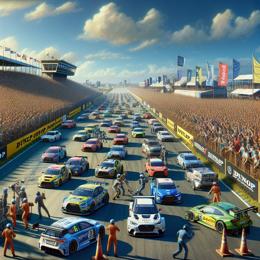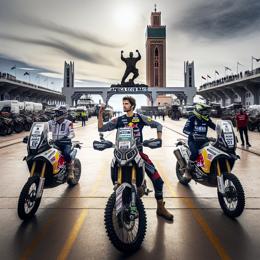Content created by AI
Ekstrom Triumphs in Dakar Rally Prologue with Al-Attiyah in Tow
Mattias Ekstrom, representing Audi, thundered through the dunes and desert plains of Al-Ula, Saudi Arabia, setting a blistering pace in the 27km prologue of the Dakar Rally, a prelude to the punishing two-week event. Ekstrom, a seasoned Swede, topped the time charts with an impressive 16 minutes and 30 seconds, laying down a marker for his rivals as the Saudi desert saga commenced.
Not to be outdone, young American talent Seth Quintero, now with Toyota, followed suit. His time, 23 seconds shy of Ekstrom's pace, was a commendable debut at this echelon, announcing his arrival on the big stage. The departure of double defending champion Nasser Al-Attiyah from Toyota to Prodrive might have been a talking point, yet Quintero's performance hinted at a seamless transition for the team.
French rallying icon, Sebastien Loeb, no stranger to desert terrain, slotted in at third, 38 seconds adrift. The nine-time world champ, still chasing a maiden Dakar victory, showed his mettle and experience, opting to attack the course - a decision that, by his own admission, paid off reasonably well.
While the prologue's results do not directly impact the overall standings, they play a critical role in strategizing the start position for the race's initial stage - a feature that could well influence the dynamics over the coming days.
In an unanticipated twist, Al-Attiyah found himself in 12th, a minute plus one second off the lead. While others might be deterred, the Qatar champion demonstrated calm resolve, attributing the result to acclimatizing with his new Prodrive car, suggesting that his campaign had hardly been derailed.
The motorbike category saw Spaniard Tosha Schareina guide his Honda to glory, securing a slender lead over Daniel Sanders and Ross Branch, who completed the prologue in the second and third spots, respectively. Title holder Kevin Benavides clocked the ninth fastest time, already chasing a deficit less than a minute from the top spot.
What lies ahead for the rally's stalwarts is a daunting 414km inaugural stage of wavering sands and imposing stone, crawling through uncharted volcanic expanses from Al-Ula to Al Henakiyah. And with stage two promising an even more arduous journey across sandy stretches and sharp stones, the rally's storytelling is far from over.
The historical context of the event enriches its narrative. Although named after the Senegalese capital, Dakar has not concluded its race there since 2007, due to security concerns. After a hiatus in Africa and a stint in South America, it found its latest residence in Saudi Arabia, assuring that the spirit of Dakar lives on, albeit continents apart from its namesake.
This 46th iteration of the Dakar Rally again tests the limits of man and machine, with competitors threading their way across a landscape that is as unforgiving as it is majestic, culminating by the Red Sea on January 19.







